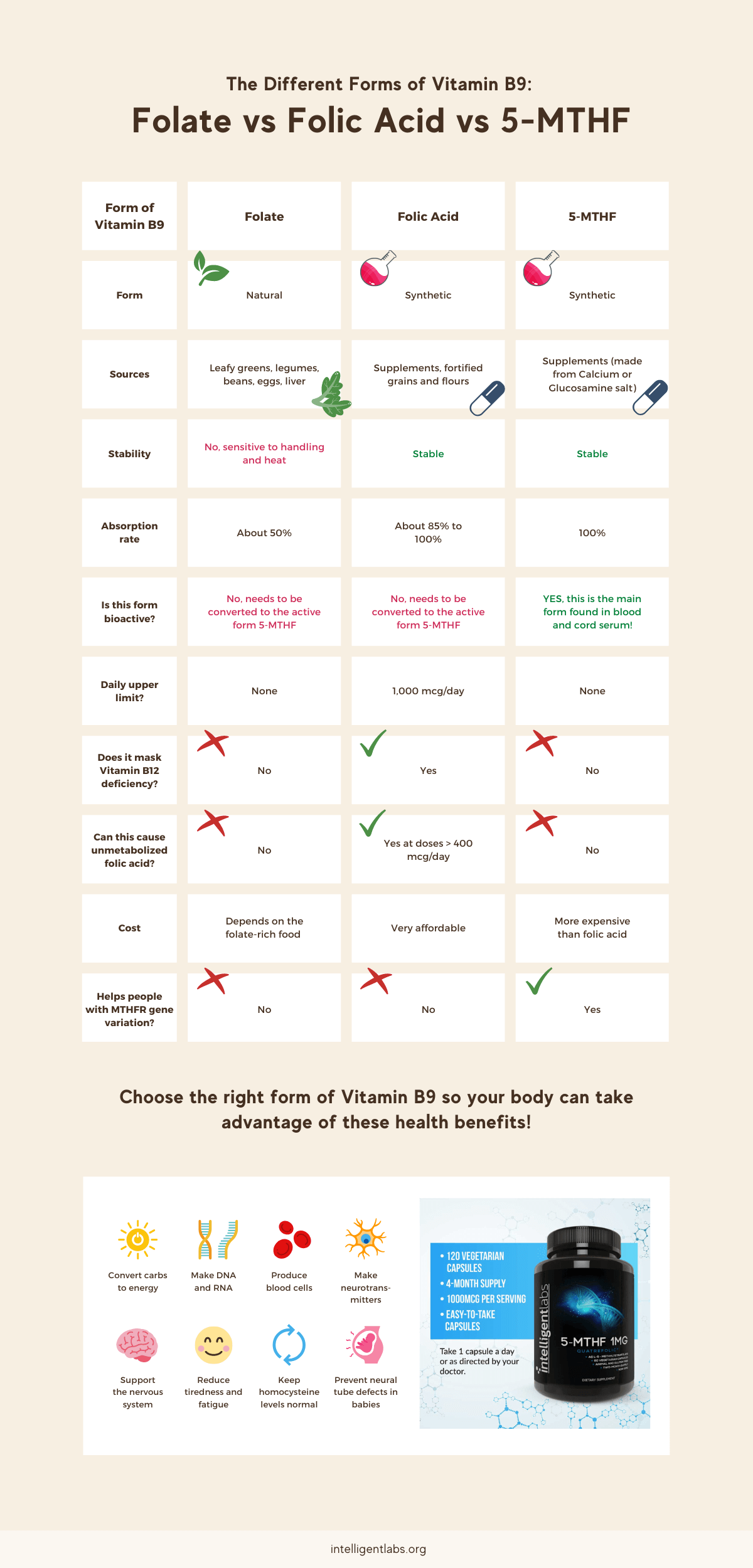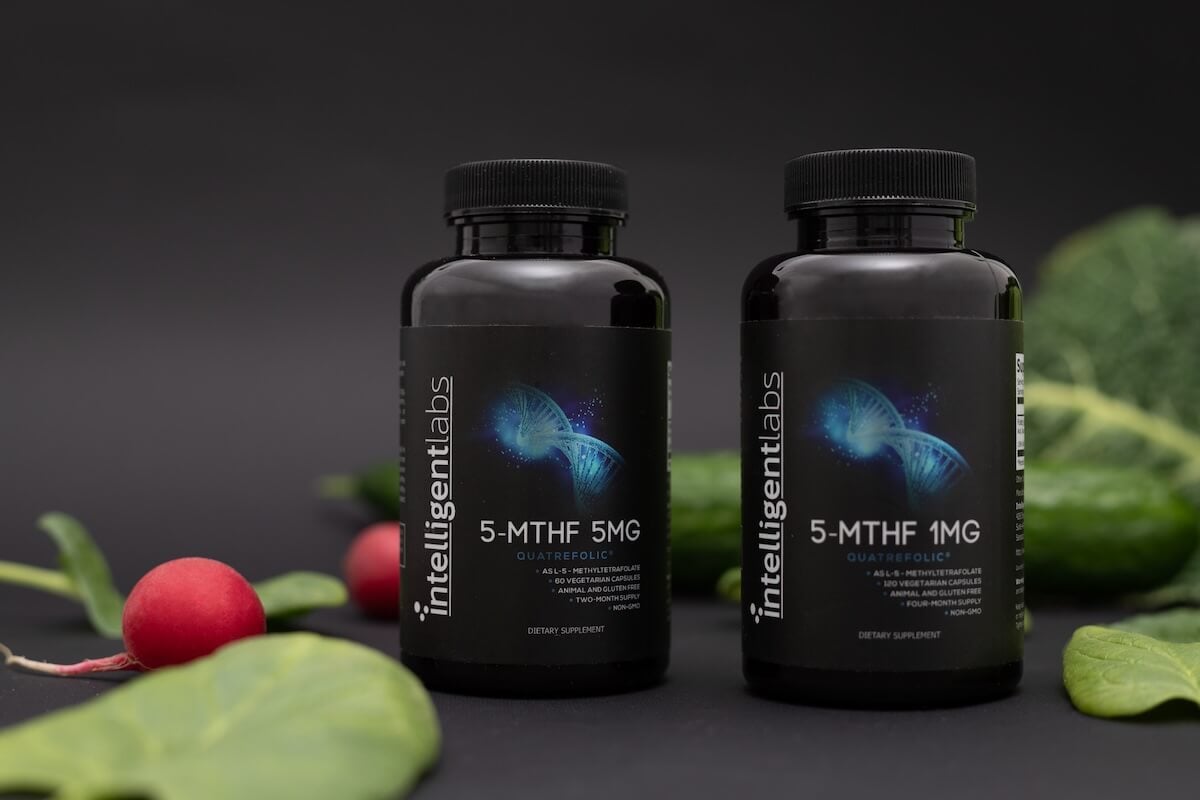What is 5-MTHF, and why does it matter? In this guide, we’ll walk you through the essentials of vitamin B9 including folate, folic acid, and 5-MTHF, the active form used in many supplements.
You’ll also find out why B9 levels can drop even if you’re eating well or taking a supplement, and what you can do to avoid that. Whether you’re already using folate or just curious, this guide will help you make sense of it all.
There’s a lot of research behind B vitamins, especially B9. We’ve reviewed the science so you don’t have to. Let’s get started!
Table of Contents
What is Folate?
Folate refers to a group of water-soluble B9 vitamins found naturally in foods like leafy greens, beans, and eggs.1 Even though it’s technically a group of compounds, most people use “folate” as if it’s a single nutrient.
Top folate-rich foods include kale, broccoli, citrus fruits, asparagus, bananas, beans, and liver.1 Of these, beans and liver offer the highest amounts.
If someone is low in folate despite eating these foods, it could be due to a medical condition or a genetic variation that affects how folate is processed. In such cases, food alone might not be enough.
What is Folic Acid?
Folic acid is the synthetic form of vitamin B9, commonly used in supplements and fortified foods. In the US, folic acid has been added to certain grain products like bread and pasta since 1998 to help prevent deficiencies.
As of 2017, 86 countries required wheat flour to be fortified with folic acid by law. Of these, 16 also mandated it for maize flour, and 6 for rice flour.2 3
What is 5-MTHF?
5-MTHF, short for 5-methyltetrahydrofolate, is the bioactive form of vitamin B9. This is the form your body can use right away, which makes it especially helpful for people who can’t properly convert folate or folic acid.
You might also see it listed as:
- L-5-MTHF
- L-methylfolate
- L-methylfolate calcium (when bound to calcium salt)
- Methylfolate
- Levomefolic acid
The “L” or “6(S)” in these names means it’s in the active form. If it says “6(R)” instead, the body can’t use it effectively.
Which Form of Folate Does Your Body Best Absorb & Use?
A study in the British Journal of Pharmacology compared folic acid with 6(S)-5-MTHF in women who had trouble processing folate due to genetic variations. The 6(S)-5-MTHF form led to significantly higher blood plasma levels of vitamin B9, meaning it was better absorbed and more bioavailable.
That version of 5-MTHF was bound to calcium salt. However, another study in rats compared calcium-based 5-MTHF to one bound to glucosamine. The glucosamine-bound version resulted in 1.8 times higher peak plasma levels than the calcium form, and 3.1 times higher than folic acid.4
That’s why Intelligent Labs uses 6(S)-5-MTHF bound to shellfish-free glucosamine in our supplements. This patented form is called Quatrefolic®, and it’s available in both 1mg and 5mg strengths.
And in case you’re wondering, yes, our 5-MTHF supplements are made in an NSF, GMP-certified facility in the USA and have been third-party tested to ensure purity and potency!
Are There Advantages of 5-MTHF Over Other Forms of Folate?
Wondering how 5-MTHF stacks up against folic acid and natural folate? Here’s a quick look at the key advantages of using the bioactive form.

What Health Benefits Do Folate & 5-MTHF Provide?
1) Required for Essential Body Functions
- Producing energy from carbohydrates
- Forming DNA, RNA, red and white blood cells
- Synthesizing melatonin (for sleep)
- Creating neurotransmitters like serotonin, dopamine, and norepinephrine
- Supporting the nervous system
2) Prevent Birth Defects During Pregnancy
Folate is critical during early pregnancy to support the baby’s nervous system development. A deficiency can raise the risk of neural tube defects, which is why healthcare providers recommend folate supplements even before conception.5 8
Read our blog post on why taking 5-MTHF activated folic acid is best for prenatal health.
3) It’s Not Just For Women… Men: This is for You, Too!
Men also need healthy folate levels when trying to conceive. A 2013 study found that low folate in men at conception may increase the risk of birth defects.9 Some women are advised to start supplementing months before pregnancy to further reduce risks.10
Click here to know more about the benefits of folic acid for men.
4) May Help With Depression
In a 2013 study of over 500 patients with depression, those who took a prescription form of 5-MTHF (7.5mg or 15mg) reported better quality of life and greater satisfaction with their treatment after three months.11 This may be due to folate’s role in neurotransmitter production.12
Small studies also suggest 5-MTHF may help with bipolar disorder. In one trial, patients reported improvements in mood, cognition, and suicidal thoughts after 6 weeks of supplementation.13
Important: If you have depression or bipolar disorder, always speak with your doctor before using folate supplements, even at low doses.
5) Lowers Homocysteine Levels
Homocysteine is a compound linked to inflammation, and high levels may increase the risk of:14
- Heart disease
- Stroke
- Alzheimer’s
- Osteoporosis
- Blood clots and atherosclerosis
Low levels of B6, B9, and B12 are associated with higher homocysteine and greater risk of cognitive decline, especially in men.15 5-MTHF can help lower homocysteine, but it works best alongside healthy levels of B6 and B12.15 16 17
Other factors like thyroid issues, kidney disease, and psoriasis can also raise homocysteine, so vitamin deficiency isn’t the only cause.14
A 24-week study showed that 5-MTHF was more effective than folic acid at lowering homocysteine in healthy individuals.18
6) May Reduce Stroke & Heart Attack Risk
Because it lowers homocysteine, 5-MTHF may reduce the risk of stroke or heart attack—but only if you’re deficient in folate.
In a 2015 study, men who took folic acid with enalapril (a blood pressure medication) had a lower risk of stroke after 4.5 years compared to those taking enalapril alone. Similar findings date back to the 1970s.19
However, some U.S. studies didn’t find a benefit, possibly because grain fortification in 1998 raised folate levels across the population. In contrast, countries like China that don’t fortify grains may still show clearer benefits.19

How Do You Know You Have a Folate Deficiency?
Folate deficiency can lead to anemia, which may cause: 20
- Chronic fatigue or sluggishness
- Shortness of breath
- Irritability
- Pale skin
- Memory issues linked to low oxygen levels
Other possible signs of low folate include: 21
- Premature graying of hair
- Swollen tongue
- Mouth sores or ulcers
- Digestive issues like diarrhea
- Poor growth or development
These symptoms can also overlap with other B vitamin deficiencies, so self-diagnosis isn’t reliable. A doctor can run specific tests to confirm if folate is the issue.
What Causes Folate Deficiency?
A Diet Lacking Folate-Rich Foods
If your diet lacks foods like beans, eggs, leafy greens, and other folate-rich options, you may not be getting enough B9.
Poor Absorption from Foods or Supplements
Even if you eat well, certain conditions and habits can interfere with folate absorption, including:20
- Crohn’s disease, celiac disease, some cancers, and kidney disorders
- MTHFR gene mutations
- Alcohol or antacid overuse
- Medications that interfere with folate metabolism
MTHFR Gene Mutations
Folate from food and folic acid from supplements must be converted into 5-MTHF before your body can use it. This process relies on a gene called MTHFR. Everyone has two copies, but many people carry variations that slow down or block the conversion.
If one copy is affected, conversion efficiency drops. If both are, your body may hardly convert folate at all.22
A DNA test can confirm if you have an MTHFR mutation. Your doctor can recommend a lab.
The simplest workaround? Take a 5-MTHF supplement. It’s already in the active form your body needs, so no conversion is required.
Obesity
There’s a strong link between obesity and low folate levels, though researchers aren’t exactly sure why.
For instance, a review of studies from 2005 to 2015 found this was especially common in women of childbearing age and couldn’t be explained by diet, supplements, or age alone.23 Another review led to the 2016 update of bariatric surgery guidelines, which found up to 54% of obese patients were folate deficient and recommended screening before surgery.24
More recent data from the Korean National Health and Nutrition Examination Survey (2016–2018) confirmed that lower folate levels were linked to obesity and higher CRP levels, particularly in middle-aged adults.25
Does Cooking Destroy Folate in Food?

It depends on the food, cooking method, and duration.
Boiling spinach and broccoli can cut their folate content in half, while steaming preserves it. Boiling potatoes or grilling meat doesn’t seem to affect folate levels, even with extended cooking times.26
Boiling onions reduces folate by about 35%, but baking only cuts 15%. For peas, boiling retains more folate than other methods. As for beans, boiling for two hours followed by baking or frying can destroy up to 50%. One study suggests soaking beans in saltwater before boiling in fresh water to preserve nutrients.27
Should Pregnant or Expecting Mothers Supplement with Folate?
Yes. Folate is essential for early fetal development, especially the nervous system. Since many women don’t know they’re pregnant until several weeks in, doctors often recommend starting folate supplements while trying to conceive.5 8
Using 5-MTHF ensures you’re getting the bioactive form your body can absorb. That said, always consult your doctor before starting any supplement.
Can You Get Too Much Folate?
The concern isn’t with natural folate or 5-MTHF, but with high levels of folic acid, the synthetic form. Some research suggests excess folic acid may lead to unmetabolized folic acid buildup, which could pose health risks, though findings are still debated.28
Here’s what too much folic acid may do:
- Hide B12 deficiency: Excess folic acid can mask the signs of megaloblastic anemia caused by low B12, making diagnosis harder and potentially worsening neurological symptoms like confusion and memory loss.29
- Sleep and mood problems: Some people report insomnia or irritability with high folic acid intake.30
- Nausea and appetite loss: Overdoing it with folic acid supplements or multivitamins may cause digestive discomfort.29
Again, these issues don’t seem to apply to 5-MTHF or folate from whole foods.
What’s the Safe Limit?
The U.S. National Institutes of Health recommends a daily upper limit of 1 mg of folic acid from supplements and fortified foods. There’s no set limit for folate from vegetables or 5-MTHF.28
But it’s easy to go over that 1 mg limit with everyday foods. According to Harvard Health:31
- 1 bowl Special K cereal: 0.394 mg
- 1 serving of pretzels: 0.172 mg
- 1 cup cooked spaghetti: 0.166 mg
- 1 multivitamin: 0.4 mg
- Total: 1.132 mg
If you take 5-MTHF, try to minimize extra folic acid from grains and multivitamins. And don’t forget to keep an eye on your B12 levels, especially if you’re older or follow a vegetarian diet.
What Dosage Should I Start With?
Most people start with 1 mg per day. In some cases, higher doses like 5 mg may be recommended, but always consult your doctor to determine the right amount. More is not always better.
Who Should NOT Take 5-MTHF?
Avoid 5-MTHF if you have a known allergy to it. Signs may include hives, chest tightness, or difficulty breathing. Always speak with your doctor before taking it if you:32
- Are allergic to folic acid
- Have a history of B12 deficiency
- Are pregnant, nursing, or trying to conceive
- Have bipolar disorder
Will 5-MTHF React With My Medications?
5-MTHF is less likely to interact with medications than folic acid, but that doesn’t make it risk-free. Always check with your doctor, especially if you’re taking:33 34
- Anti-seizure medications
- Methotrexate
- Pyrimethamine (Daraprim)
Conclusion: Is 5-MTHF Right for You?
If you’re looking for a form of folate that your body can use right away, especially if you have trouble absorbing folic acid or natural folate, 5-MTHF may be the better option. It’s already bioactive, generally better absorbed, and less likely to interfere with medications.
That said, folate needs can vary depending on your health, diet, genetics, and even life stage. Whether you’re planning a pregnancy, managing a deficiency, or just aiming for better overall wellness, talk to your doctor before starting any supplement.
The bottom line? Understanding your options is the first step. Choosing the right one is easier when you’re informed, and now, you are.
💬 Got questions about folate or 5-MTHF? Drop them in the comments. We’re here to help you make sense of the science.
📩 Want more practical tips on nutrients that actually work? Join our newsletter for science-backed advice (and exclusive offers on smarter supplements).
References:
- Folic Acid. WebMD. https://www.webmd.com/vitamins/ai/ingredientmono-1017/folic-acid. ↩︎
- Pachón H, Codling K. Fortification with Folic Acid. Asia-Pacific Conference on Human Genetics. https://static1.squarespace.com/static/5e1df234eef02705f5446453/t/5f33223f1d14c20ff5732f3a/1597186628725/Fortification_with_Folic_Acid.pdf ↩︎
- Crider KS, Bailey LB, Berry RJ. Folic acid food fortification-its history, effect, concerns, and future directions. Nutrients. 2011;3(3):370-84. Retrieved from https://www.ncbi.nlm.nih.gov/pmc/articles/PMC3257747/ ↩︎
- Miraglia N, Agostinetto M, Bianchi D, Valoti E. Enhanced oral bioavailability of a novel folate salt: comparison with folic acid and a calcium folate salt in a pharmacokinetic study in rats. Minerva Ginecol. 2016;68(2):99-105. Retrieved from https://www.ncbi.nlm.nih.gov/pubmed/27008238 ↩︎
- Estroff Mareno H. The Folate Factor: Among the busiest of B vitamins, folate has a special role in depression treatment. Psychology Today. https://www.psychologytoday.com/us/articles/201901/the-folate-factor ↩︎
- Folate deficiency. MedlinePlus. U.S. National Library of Medicine. https://medlineplus.gov/ency/article/000354.htm. ↩︎
- Fuqua K. Vitamins to Help Break Down Carbs. SFGate. https://healthyeating.sfgate.com/vitamins-break-down-carbs-4715.html. ↩︎
- Hibbard BM. THE ROLE OF FOLIC ACID IN PREGNANCY*. With Particular Reference to Anaemia, Abruption and Abortion. BJOG: An International Journal of Obstetrics and Gynaecology. 1964;71(4):529-542. doi:10.1111/j.1471-0528.1964.tb04317.x Retrieved from https://obgyn.onlinelibrary.wiley.com/doi/abs/10.1111/j.1471-0528.1964.tb04317.x ↩︎
- Lambrot R, Xu C, Saint-Phar S, et al. Low paternal dietary folate alters the mouse sperm epigenome and is associated with negative pregnancy outcomes. Nature Communications. 2013;4(1). doi:10.1038/ncomms3889 Retrieved from https://www.nature.com/articles/ncomms3889 ↩︎
- Mayo Clinic Staff. Folate (Folic Acid). Mayo Clinic. https://www.mayoclinic.org/drugs-supplements-folate/art-20364625. ↩︎
- Shelton RC, Sloan Manning J, Barrentine LW, Tipa EV. Assessing Effects of l-Methylfolate in Depression Management: Results of a Real-World Patient Experience Trial. Prim Care Companion CNS Disord. 2013;15(4):PCC.13m01520. Retrieved from https://www.ncbi.nlm.nih.gov/pmc/articles/PMC3869616/ ↩︎
- Fava M, Mischoulon D. Folate in depression: efficacy, safety, differences in formulations, and clinical issues. J Clin Psychiatry. 2009;70 Suppl 5:12-7. Retrieved from https://www.ncbi.nlm.nih.gov/pubmed/19909688 ↩︎
- Kiefer D. L-methylfolate for Bipolar Disorder. Relias Media. https://www.reliasmedia.com/articles/141976-l-methylfolate-for-bipolar-disorder. ↩︎
- Anthony K. High Homocysteine Level (Hyperhomocysteinemia). Healthline. https://www.healthline.com/health/homocysteine-levels. ↩︎
- Tucker KL, Qiao N, Scott T, Rosenberg I, Spiro A. High homocysteine and low B vitamins predict cognitive decline in aging men: the Veterans Affairs Normative Aging Study. Am J Clin Nutr. 2005;82(3):627-35. Retrieved from https://www.ncbi.nlm.nih.gov/pubmed/16155277 ↩︎
- Malouf R, Grimley Evans J. Folic acid with or without vitamin B12 for the prevention and treatment of healthy elderly and demented people. Cochrane Database Syst Rev. 2008;8( 4):CD004514. Retrieved from https://www.ncbi.nlm.nih.gov/pubmed/18843658 ↩︎
- Ford AH, Flicker L, Alfonso H, et al. Vitamins B(12), B(6), and folic acid for cognition in older men. Neurology. 2010;75(17):1540-7. Retrieved from https://www.ncbi.nlm.nih.gov/pubmed/20861451 ↩︎
- Venn BJ, Green TJ, Moser R, Mann JI. Comparison of the effect of low-dose supplementation with L-5-methyltetrahydrofolate or folic acid on plasma homocysteine: a randomized placebo-controlled study. Am J Clin Nutr. 2003;77(3):658-62. Retrieved from https://www.ncbi.nlm.nih.gov/pubmed/12600857 ↩︎
- Corliss J. Folic acid, a B vitamin, lowers stroke risk in people with high blood pressure. Harvard Health Blog. Harvard Health Publishing. https://www.health.harvard.edu/blog/folic-acid-a-b-vitamin-lowers-stroke-risk-in-people-with-high-blood-pressure-201503187810. ↩︎
- Cufasso J. Folate Deficiency. Healthline. https://www.healthline.com/health/folate-deficiency. ↩︎
- Folic acid in diet. MedlinePlus. https://medlineplus.gov/ency/article/002408.htm. ↩︎
- MTHFR gene variant. Genetic and Rare Diseases Information Center. National Center for Advancing Translational Sciences. U.S. National Institutes of Health. https://rarediseases.info.nih.gov/diseases/10953/mthfr-gene-mutation. ↩︎
- Maffoni S, De Giuseppe R, Stanford FC, Cena H. Folate status in women of childbearing age with obesity: a review. Nutr Res Rev. 2017;30(2):265-71. Retrieved from https://www.ncbi.nlm.nih.gov/pmc/articles/PMC6232191/ ↩︎
- Parrott J, Frank L, Rabena R, Craggs-Dino L, Isom KA, Greiman L. American Society for Metabolic and Bariatric Surgery Integrated Health Nutritional Guidelines for the Surgical Weight Loss Patient 2016 Update: Micronutrients. Surgery for Obesity and Related Diseases. 2017;13(5):727-741. doi:10.1016/j.soard.2016.12.018. Retrieved from https://asmbs.org/app/uploads/2008/09/ASMBS-Nutritional-Guidelines-2016-Update.pdf ↩︎
- Lee, Mee-Ri, and Sung Min Jung. “Serum Folate Related to Five Measurements of Obesity and High-Sensitivity C-Reactive Protein in Korean Adults.” Nutrients vol. 14,17 3461. 24 Aug. 2022, doi:10.3390/nu14173461 ↩︎
- McKillop DJ, Pentieva K, Daly D, et al. The effect of different cooking methods on folate retention in various foods that are amongst the major contributors to folate intake in the UK diet. Br J Nutr. 2002;88(6):681-8. Retrieved from https://www.ncbi.nlm.nih.gov/pubmed/12493090 ↩︎
- Fabbri ADT, Crosby GA. A review of the impact of preparation and cooking on the nutritional quality of vegetables and legumes. International Journal of Gastronomy and Food Science. 2016;3:2-11. doi:10.1016/j.ijgfs.2015.11.001 Retrieved from https://www.sciencedirect.com/science/article/pii/S1878450X15000207 ↩︎
- Folic Acid. Office on Women’s Health. U.S. Department of Health and Human Services. https://www.womenshealth.gov/a-z-topics/folic-acid. ↩︎
- Folate. Office of Dietary Supplements. U.S. National Institutes of Health. https://ods.od.nih.gov/factsheets/Folate-HealthProfessional/. ↩︎
- Mayo Clinic Staff. Folate (Folic Acid). Mayo Clinic. https://www.mayoclinic.org/drugs-supplements-folate/art-20364625. ↩︎
- Folic acid: Too much of a good thing? Harvard Heart Letter. Harvard Health Publishing. https://www.health.harvard.edu/newsletter_article/Folic_acid_Too_much_of_a_good_thing. ↩︎
- Multum C. L-Methylfolate. Drugs.com. https://www.drugs.com/mtm/l-methylfolate.html ↩︎
- Vitamins and Supplements: Folic Acid. WebMD. https://www.webmd.com/vitamins/ai/ingredientmono-1017/folic-acid. ↩︎
- Folic Acid, Vitamin B9 tablets. Cleveland Clinic Health Library. https://my.clevelandclinic.org/health/drugs/18719-folic-acid-vitamin-b9-tablets. ↩︎





